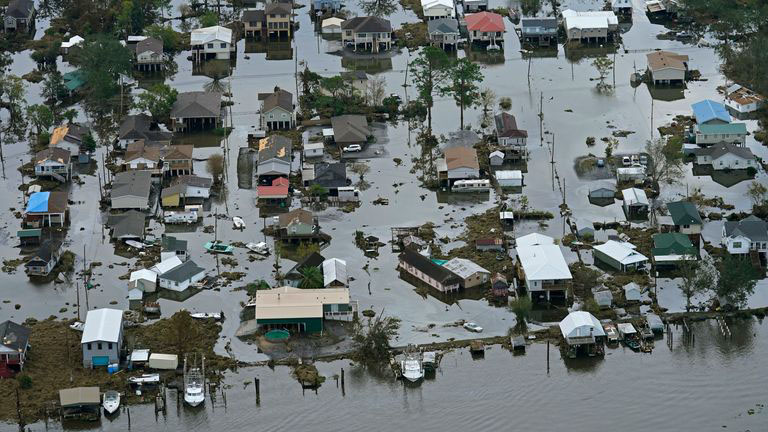As if the socio-economic ravages of the coronavirus pandemic are not sufficient to retard the development of Caribbean countries years into the future, there are signs that a much more familiar malady, rampaging weather, is about to make yet another immediately impactful intervention in the region. With the worst of this season’s frequently devastating tropical storms believed to be still ahead, farmers in some countries in the region, including the Caribbean Community (CARICOM) territory of Jamaica, are already engaged in the familiar pursuit of counting the costs of crop losses, the result of three tropical storms – Else, Grace and Ida – that have already made the customary seasonal visits. The bottom line? Less than halfway into the hurricane season the seriously vulnerable islands of the region are likely in for another torrid time.
The question that lies ahead has to do with whether the already fragile economies of the region, already badly shook up by the COVID-19 pandemic, are not now on the cusp of the worst socio-economic crises in their history.
It is not so much the fact of the hurricanes and the damage that they leave behind as it is their incremental intensity and the wearing down effect which they continue to have on already shaky economies that is worrisome. Add to this, the fact that it has now been established beyond reasonable doubt that the hurricanes are a manifestation of changing weather patterns associated with climate change and the reality becomes one in which the pattern is likely to worsen in the years and decades ahead.
This much has already been confirmed by an Assessment Report prepared by the Intergovernmental Panel on Climate Change (IPCC), Assessment Report (AR6) which projects an increased frequency and intensity of hurricanes and more frequent, prolonged floods, droughts and dry spells, going forward. Additionally, sea levels are rising faster, and heat waves are more intense and are occurring more often.
What is believed to lie ahead, could amount to an apocalyptic scenario for a Caribbean region where economic survival and social normalcy depends almost entirely on the vicissitudes of the weather. Agriculture and tourism, in the absence of which sectors the very survival of the Caribbean becomes an issue, are immediately and particularly vulnerable to climate change.
Nor can the social and economic planners afford to ignore the conclusion in the AR6 report that it is virtually certain that there will be more frequent hot extremes and fewer cold extremes over most land areas as the climate warms. The Report also confirms that for most small-island states, including those that are part of the Caribbean, climate change is already here.
Recently, in a document titled, Carib-bean Under Threat! 10 Urgent Takeaways for the Caribbean, co-heads of the University of the West Indies Mona, Climate Studies Group (CSG), Professors Tannecia Stephenson and Michael Taylor warned that “we can now say with greater certainty that climate change is making our weather worse. It is affecting the intensity of heat waves, droughts, floods and hurricanes, all of which are impacting the Caribbean.” Simultaneously, the two endorsed the IPCC’s warning that “The world will exceed 1.5 degrees between now and 2040” and will urge Caribbean leaders to collectively lobby for deeper global greenhouse gas reductions at the 26th Conference of the Parties (COP26) of the UN Convention on Climate Change scheduled to take place in Glasgow, Scotland from October 31 to November 12, 2021.
While AR6 offered some hope, in that there is still time to limit global heating to between 1.5 and 2.0 degrees of pre-industrial levels, Stephenson noted that there is an urgent need for more drastic cuts in emissions adding that the region must also “drastically reduce its footprint even further,” through greater use of renewables, the preservation of marine and land-based forests and by reducing emissions from waste and transportation. The ‘bottom line’ for the Caribbean, Stephenson adds, is that it will have to endure multiple concurrent threats with every additional incremental increase in temperature. To this is likely to be added atmospheric warming and more acidic seas and oceans, circumstances that will impact tourism and fisheries, two key economic pursuits for the region.
The 20-country grouping of the Carib-bean Community has agreed to rally around the slogan ‘1.5 to stay Alive’ based on the premise that viability of the territories here, is dependent on global temperatures remaining below or at 1.5 degrees above pre-industrial levels. But with global temperatures already at 1.1 of the 1.5 degree tipping point warming is outstripping the pace of the region’s response.
“If there ever was a time to step up the global campaign for 1.5 degrees, it is now,” says Stephenson.
The Climate Studies Group has warned that some individual years will hit 1.5 degrees even before 2040, when temperatures are expected to exceed that target.





